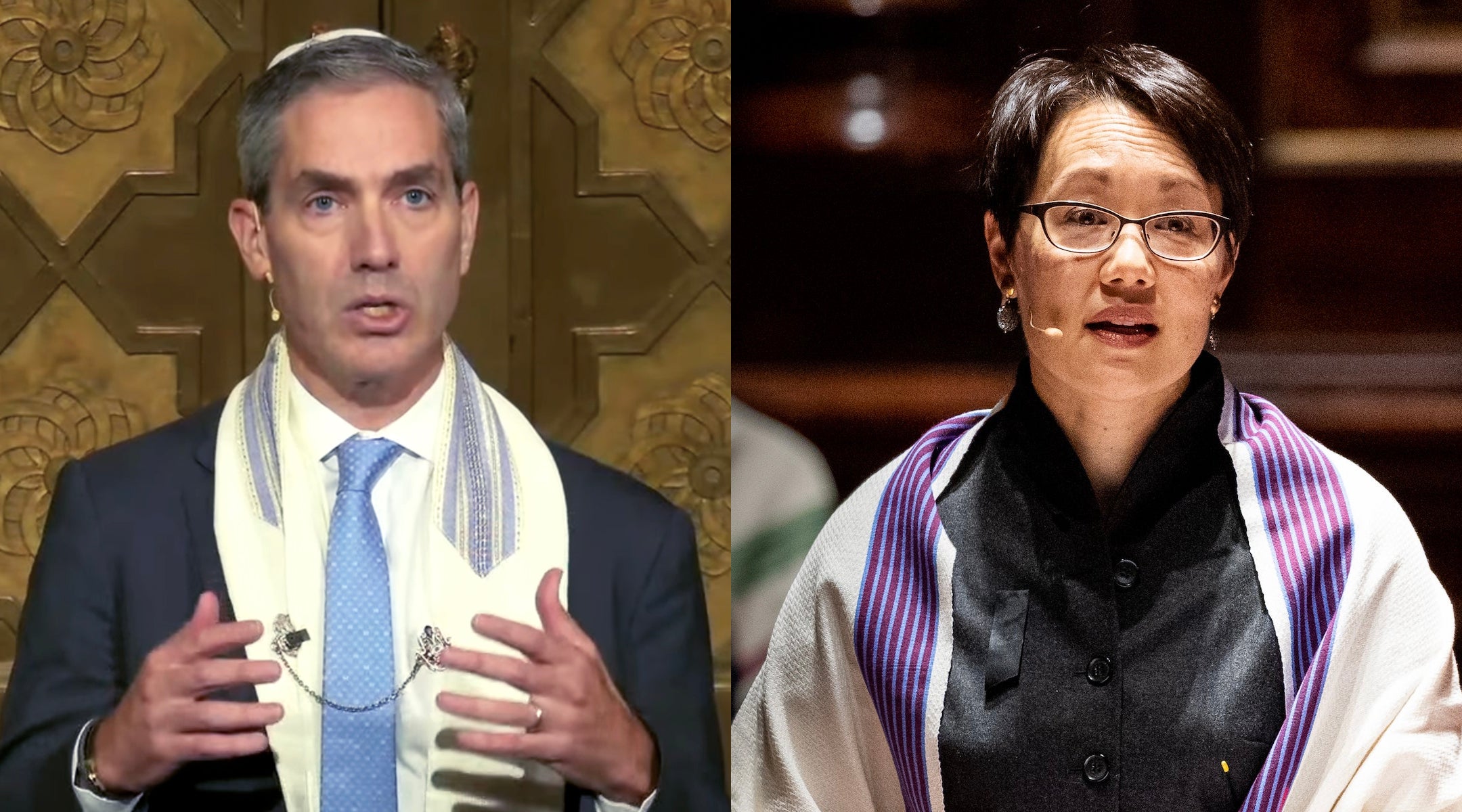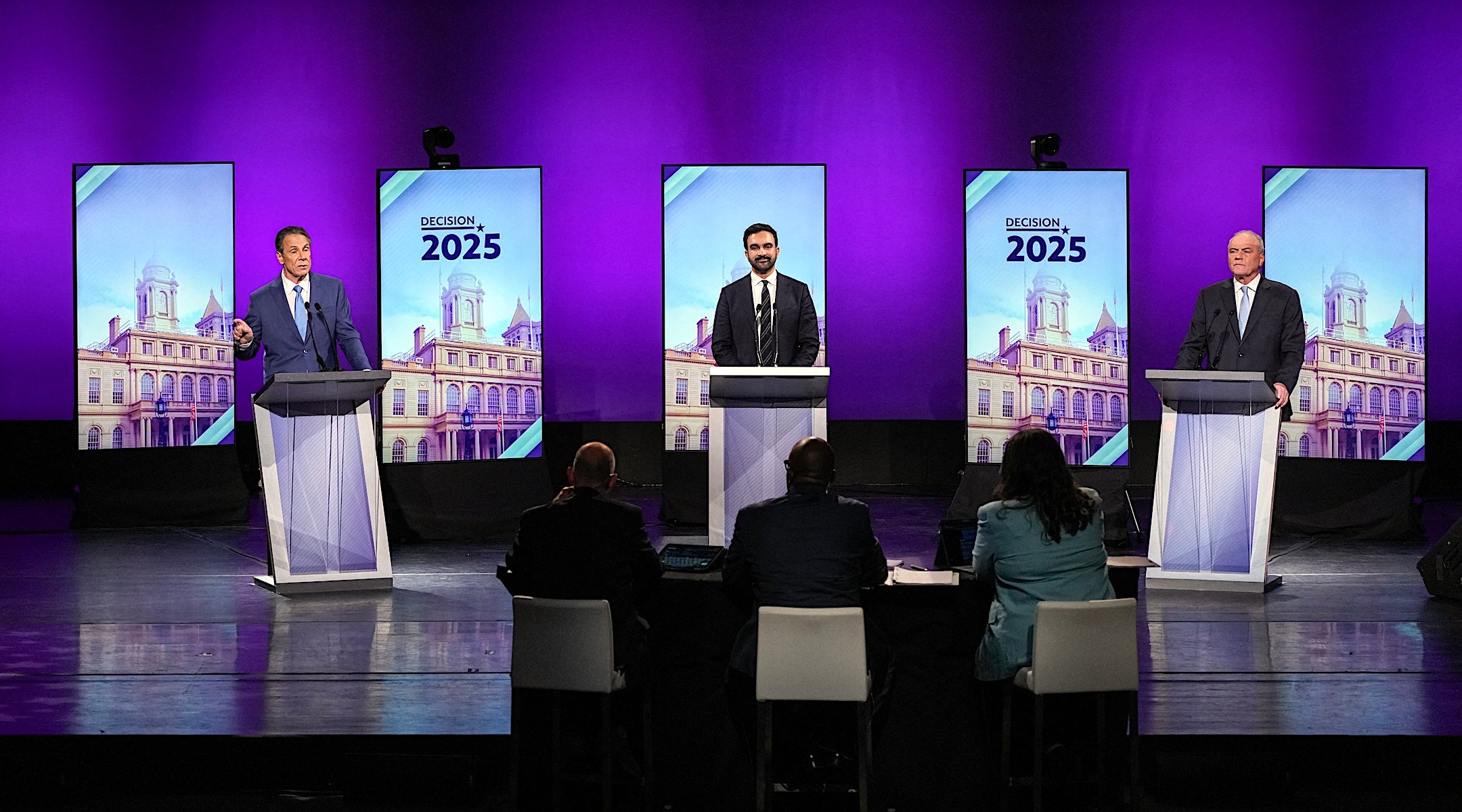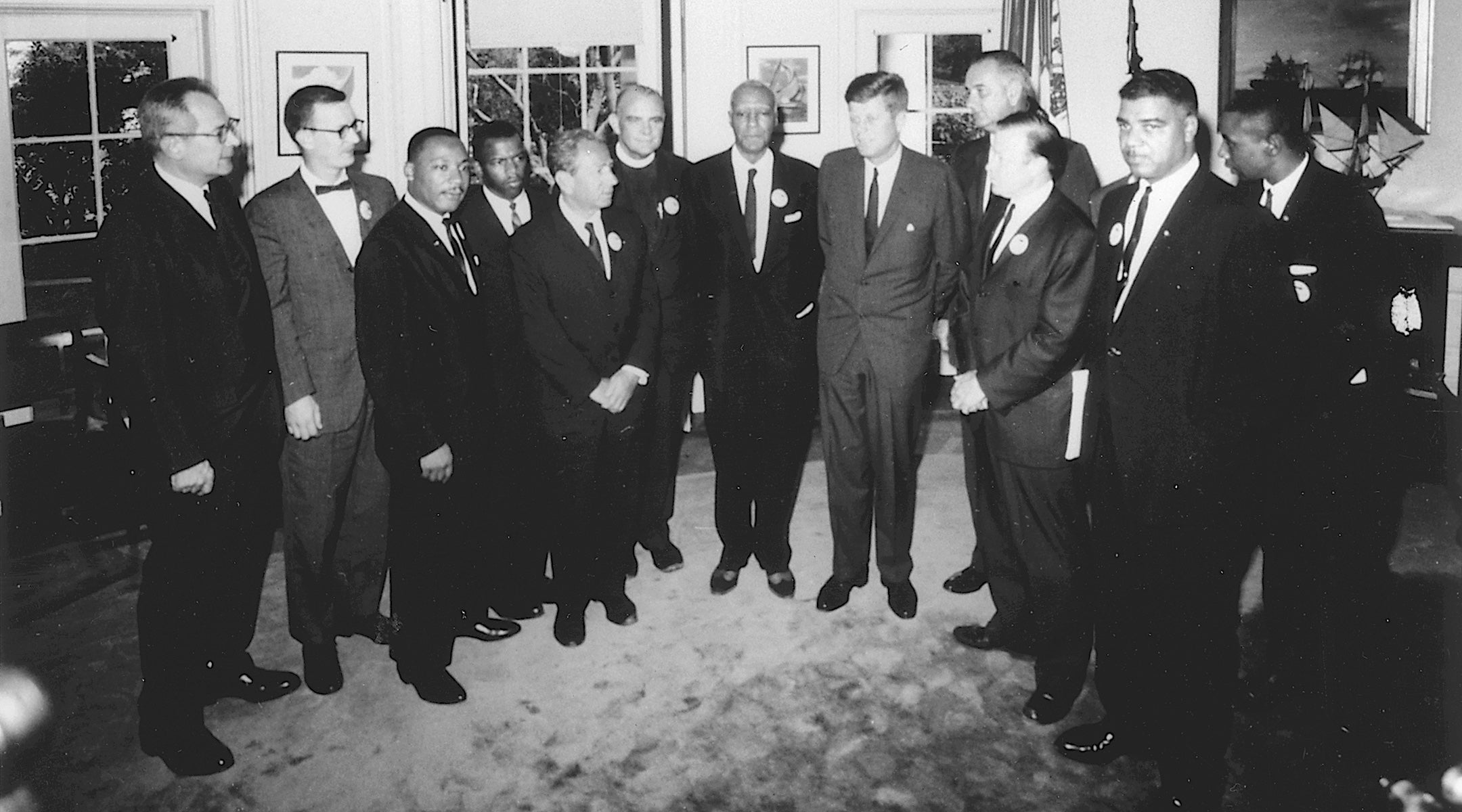Uncategorized
Rabbis Angela Buchdahl and Elliot Cosgrove show the split in the pulpit over political endorsements

Go figure: A non-Jewish, non-Zionist politician has sparked a national Jewish conversation about the role of the rabbi.
If elected next week, the 34-year-old progressive Zohran Mamdani would be the first mayor of New York City who came up through the trenches of pro-Palestinian activism, and the first to reject the idea that being mayor to a city with 1 million Jews means being a supporter of Israel.
The prospect has shaken a Jewish mainstream that has long taken that support for granted, considers Zionism a pillar of its Jewish identity and sees Mamdani as an enabler of the kind of strident anti-Israel protests that make them feel unsafe.
In turn, that has put pressure on rabbis throughout the five boroughs and beyond to take a stand — not just by defending Zionism and Jewish security but by denouncing Mamdani and endorsing his rivals. With the IRS in July having lifted the 60+-year-old ban that prevented houses of worship from endorsing or opposing candidates, rabbis who would prefer to stay above the fray have lost their cover.
Also gone are the days when the decision to use the bimah as a bully pulpit was between a rabbi and his or her congregation. Non-Orthodox synagogues regularly post their rabbis’ Shabbat sermons to YouTube. A petition signed by over 1,100 rabbis calling on voters to reject anti-Zionist candidates like Mamdani has become a very public roll call of rabbis who are willing to engage directly in electoral politics.
The inescapably public profile of being a rabbi amid a high-stakes election was seen in the contrasting positions taken by leaders of two influential and prosperous Manhattan congregations. In a sermon shared on YouTube and the synagogue’s web site, Rabbi Elliot Cosgrove of Park Avenue Synagogue made his position clear from his very first sentence: “I believe Zohran Mamdani poses a danger to the security of New York’s Jewish community.” He not only urged members of his Conservative shul to vote for Mamdani’s leading rival, former New York Gov. Andrew Cuomo, but laid out a specific strategy for convincing undecided and Mamdani-curious Jewish voters to do the same.
About 30 blocks south, Rabbi Angela Buchdahl of Central Synagogue, whose recent sermon on the Gaza war drew over 120,000 views on YouTube, wrote a letter to her Reform congregation about the mayoral race. Without naming Mamdani, she insisted that elected leaders “must reject the idea that Jewish self-determination is up for negotiation,” while reaffirming her synagogue’s policy “of not endorsing or publicly opposing political candidates.”
Some might find that coy — a rabbinic version of the New York Times’ controversial “non-endorsement” endorsement of Cuomo. But Buchdahl has become one of the country’s best-known rabbis in part on her ability to articulate Jewish concerns in a way that embraces and respects those who might disagree with her. Her Gaza sermon deftly conveyed Jewish dismay over the scale of the killings and hunger in Gaza while sympathizing with the fears and dilemmas of average Israelis.

Former N.Y. Gov. Andrew Cuomo, Democratic candidate Zohran Mamdani and Republican candidate Curtis Sliwa participate in the second New York City mayoral debate at LaGuardia Community College in Queens, New York, Oct. 22, 2025. (Hiroko Masuike/Pool/AFP)
The letter makes clear where she and her team stand on Zionism and fighting antisemitism: “We have spoken from the pulpit in multiple past sermons and will continue to take a clear, unambiguous position on antisemitism, on anti-Zionist rhetoric, and on sharing our deep support for Israel.” Mamdani was unmistakably the subject when she added, “I hope and expect anyone who becomes mayor of our amazing city — home to the largest Jewish population outside of Israel — will take very seriously the expressed concerns (made directly and publicly) of so many of us in the Jewish community.”
She also explains why the synagogue considers nonpartisanship a practical and spiritual value. “It remains our conviction that political endorsements of candidates are not in the best interest of our congregation, community, or country,” she writes, adding, “Our role is not to enter political campaigns or to endorse or speak out against candidates, but to provide moral and spiritual clarity on important public issues.”
Cosgrove doesn’t explicitly address the debate over whether a rabbi should endorse a political candidate, but writes that the stakes of the mayoral race are too high for him not to weigh in on the candidates.
“I wish it were otherwise,” he said. “I wish we had two candidates with equal interest, or better yet, equal disinterest in the Jewish community…. But this election cycle, that is simply not the case. We can only play the cards we are dealt. And in this hand, I choose to play the one that safeguards the Jewish people, protects our community, and ensures that our seat at the table remains secure.”
He also defends his public political stand in spiritual terms.
“Self-preservation and self-interest are not only legitimate, but essential to sustaining an ethical life,” he said, citing the Talmudic sage Hillel.
While both rabbis have ranged widely in their sermons and activism, their messages on the mayor’s race offer two different models for leadership. Cosgrove spoke in the voice of a political strategist and community organizer; Buchdahl’s letter was about protecting the integrity of her institution and the diverse individuals it serves.
By dint of their influential congregations, media savvy and charisma, Cosgrove and Buchdahl are rabbis with citywide and, especially in Buchdahl’s case, national stature. The rabbis’ petition quoted Cosgrove, although he did not sign it; Buchdahl recently promoted her memoir about growing up Korean-American, and her unasked for role as a hostage negotiator, on CBS Mornings. Their positions have weight in a debate that has dogged rabbis ever since the pulpit became a place not just for parsing fine points of Jewish law or offering homilies, but commenting on current events.

Rabbi Joachim Prinz, fourth from left in front row, joins leaders of the March on Washington, including Martin Luther King Jr. (third from left), at an Oval Office meeting with President John F. Kennedy, Aug. 28, 1963. (U.S. National Archives and Records Administration)
A frequently cited role model for activist rabbis is Joachim Prinz, the German refugee who led congregations in Newark, New Jersey and its suburbs in the last century. Even before leaving Germany he would rail against the Nazis. In America, he bucked the clear isolationist trend — and fear among many Jews of a backlash — by insisting that Europe’s fight was America’s fight.
Prinz rejected the traditional model of the drash, or homily, finding it “too solemn and lacking in concrete meaning. I was always out to find something relevant to the life of the people sitting in front of me.” He wondered how seriously people would take a faith tradition whose clergy couldn’t offer guidance on, say, waging war, addressing poverty or resisting authoritarianism.
Throw in Jewish security, and the stakes get higher yet.
Prinz’s jeremiads against Nazism and later in support of civil rights would assure his place in American-Jewish history. Whether it would assure him a place in a modern American pulpit is another story. Support for “social justice” — in the form of volunteerism and charitable giving — is fine. Also tolerated is a certain amount of activism on consensus issues, which have lately become elusive.
As for urging specific stands on candidates or pieces of legislation — rabbis quickly learn that neither smooths their path to contract renewal.
For many congregants, this is as it should be. They feel that the great knotty corpus of Jewish text shouldn’t be reduced to a policy prescription, or that they shouldn’t be forced to hear a political speech in a house of worship.
Cosgrove especially anticipated the kinds of objections — mostly tactical — he thought he might get from congregants: Opposing a popular candidate like Mamdani would invite an antisemitic backlash, or centering Zionism in the mayor’s race would confirm the slander of dual loyalty.
Buchdahl faced the opposite pressure: congregants insisting she endorse Cuomo. There have been some nasty Instagram posts calling her timid, with comments suggesting that some congregants may have resigned over the saga.
Buchdahl’s letter insists that declining to endorse does not mean she and the synagogue are abdicating their responsibility to Jewish safety. Rather, she wrote, the synagogue does its job by instilling the values that shape the political decisions of its congregants.
“Our role,” she wrote, “is not to enter political campaigns or to endorse or speak out against candidates, but to provide moral and spiritual clarity on important public issues.”
—
The post Rabbis Angela Buchdahl and Elliot Cosgrove show the split in the pulpit over political endorsements appeared first on Jewish Telegraphic Agency.
Uncategorized
Tucker’s Ideas About Jews Come from Darkest Corners of the Internet, Says Huckabee After Combative Interview

US Ambassador to Israel Mike Huckabee looks on during the day he visits the Western Wall, Judaism’s holiest prayer site, in Jerusalem’s Old City, April 18, 2025. Photo: REUTERS/Ronen Zvulun
i24 News – In a combative interview with US Ambassador to Israel Mike Huckabee, right-wing firebrand Tucker Carlson made a host of contentious and often demonstrably false claims that quickly went viral online. Huckabee, who repeatedly challenged the former Fox News star during the interview, subsequently made a long post on X, identifying a pattern of bad-faith arguments, distortions and conspiracies in Carlson’s rhetorical style.
Huckabee pointed out his words were not accorded by Carlson the same degree of attention and curiosity the anchor evinced toward such unsavory characters as “the little Nazi sympathizer Nick Fuentes or the guy who thought Hitler was the good guy and Churchill the bad guy.”
“What I wasn’t anticipating was a lengthy series of questions where he seemed to be insinuating that the Jews of today aren’t really same people as the Jews of the Bible,” Huckabee wrote, adding that Tucker’s obsession with conspiracies regarding the provenance of Ashkenazi Jews obscured the fact that most Israeli Jews were refugees from the Arab and Muslim world.
The idea that Ashkenazi Jews are an Asiatic tribe who invented a false ancestry “gained traction in the 80’s and 90’s with David Duke and other Klansmen and neo-Nazis,” Huckabee wrote. “It has really caught fire in recent years on the Internet and social media, mostly from some of the most overt antisemites and Jew haters you can find.”
Carlson branded Israel “probably the most violent country on earth” and cited the false claim that Israel President Isaac Herzog had visited the infamous island of the late, disgraced sex offender Jeffrey Epstein.
“The current president of Israel, whom I know you know, apparently was at ‘pedo island.’ That’s what it says,” Carlson said, citing a debunked claim made by The Times reporter Gabrielle Weiniger. “Still-living, high-level Israeli officials are directly implicated in Epstein’s life, if not his crimes, so I think you’d be following this.”
Another misleading claim made by Carlson was that there were more Christians in Qatar than in Israel.
Uncategorized
Pezeshkian Says Iran Will Not Bow to Pressure Amid US Nuclear Talks

Iranian President Masoud Pezeshkian attends the Shanghai Cooperation Organisation (SCO) Summit 2025, in Tianjin, China, September 1, 2025. Iran’s Presidential website/WANA (West Asia News Agency)/Handout via REUTERS
Iranian President Masoud Pezeshkian said on Saturday that his country would not bow its head to pressure from world powers amid nuclear talks with the United States.
“World powers are lining up to force us to bow our heads… but we will not bow our heads despite all the problems that they are creating for us,” Pezeshkian said in a speech carried live by state TV.
Uncategorized
Italy’s RAI Apologizes after Latest Gaffe Targets Israeli Bobsleigh Team

Milano Cortina 2026 Olympics – Bobsleigh – 4-man Heat 1 – Cortina Sliding Centre, Cortina d’Ampezzo, Italy – February 21, 2026. Adam Edelman of Israel, Menachem Chen of Israel, Uri Zisman of Israel, Omer Katz of Israel in action during Heat 1. Photo: REUTERS/Athit Perawongmetha
Italy’s state broadcaster RAI was forced to apologize to the Jewish community on Saturday after an off‑air remark advising its producers to “avoid” the Israeli crew was broadcast before coverage of the Four-Man bobsleigh event at the Winter Olympics.
The head of RAI’s sports division had already resigned earlier in the week after his error-ridden commentary at the Milano Cortina 2026 opening ceremony two weeks ago triggered a revolt among its journalists.
On Saturday, viewers heard “Let’s avoid crew number 21, which is the Israeli one” and then “no, because …” before the sound was cut off.
RAI CEO Giampaolo Rossi said the incident represented a “serious” breach of the principles of impartiality, respect and inclusion that should guide the public broadcaster.
He added that RAI had opened an internal inquiry to swiftly determine any responsibility and any potential disciplinary procedures.
In a separate statement RAI’s board of directors condemned the remark as “unacceptable.”
The board apologized to the Jewish community, the athletes involved and all viewers who felt offended.
RAI is the country’s largest media organization and operates national television, radio and digital news services.
The union representing RAI journalists, Usigrai, had said Paolo Petrecca’s opening ceremony commentary had dealt “a serious blow” to the company’s credibility.
His missteps included misidentifying venues and public figures, and making comments about national teams that were widely criticized.


